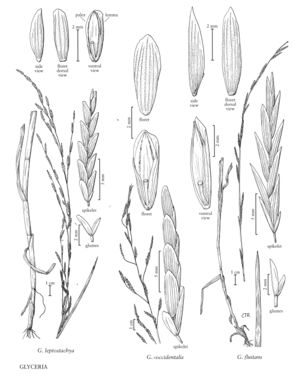Difference between revisions of "Glyceria leptostachya"
FNA>Volume Importer |
FNA>Volume Importer |
||
| Line 7: | Line 7: | ||
|synonyms={{Treatment/ID/Synonym | |synonyms={{Treatment/ID/Synonym | ||
|name=Panicularia leptostachya | |name=Panicularia leptostachya | ||
| − | |authority= | + | |authority= |
| + | |rank=species | ||
}} {{Treatment/ID/Synonym | }} {{Treatment/ID/Synonym | ||
|name=Panicularia davyi | |name=Panicularia davyi | ||
| − | |authority= | + | |authority= |
| + | |rank=species | ||
}} | }} | ||
|hierarchy=Poaceae;Poaceae subfam. Pooideae;Poaceae tribe Meliceae;Glyceria;Glyceria sect. Glyceria;Glyceria leptostachya | |hierarchy=Poaceae;Poaceae subfam. Pooideae;Poaceae tribe Meliceae;Glyceria;Glyceria sect. Glyceria;Glyceria leptostachya | ||
| Line 23: | Line 25: | ||
-->{{Treatment/Body | -->{{Treatment/Body | ||
|distribution=Oreg.;Alaska;Calif.;Wash.;B.C. | |distribution=Oreg.;Alaska;Calif.;Wash.;B.C. | ||
| − | |discussion=<p>Glyceria leptostachya grows in swamps and along the margins of streams and lakes, on the western side of the coastal mountains from southern Alaska to San Francisco Bay. It is similar to the European Glyceria notata, differing primarily in its tendency to have fewer spikelets [3-8(10) vs. 5-15(19)] on its branches.</p> | + | |discussion=<p><i>Glyceria leptostachya</i> grows in swamps and along the margins of streams and lakes, on the western side of the coastal mountains from southern Alaska to San Francisco Bay. It is similar to the European <i>Glyceria notata</i>, differing primarily in its tendency to have fewer spikelets [3-8(10) vs. 5-15(19)] on its branches.</p> |
|tables= | |tables= | ||
|references= | |references= | ||
| Line 32: | Line 34: | ||
-->{{#Taxon: | -->{{#Taxon: | ||
name=Glyceria leptostachya | name=Glyceria leptostachya | ||
| − | |||
|authority=Buckley | |authority=Buckley | ||
|rank=species | |rank=species | ||
| Line 40: | Line 41: | ||
|family=Poaceae | |family=Poaceae | ||
|illustrator=Cindy Roché | |illustrator=Cindy Roché | ||
| + | |illustration copyright=Utah State University | ||
|distribution=Oreg.;Alaska;Calif.;Wash.;B.C. | |distribution=Oreg.;Alaska;Calif.;Wash.;B.C. | ||
|reference=None | |reference=None | ||
| Line 45: | Line 47: | ||
|publication year= | |publication year= | ||
|special status= | |special status= | ||
| − | |source xml=https:// | + | |source xml=https://jpend@bitbucket.org/aafc-mbb/fna-data-curation.git/src/f50eec43f223ca0e34566be0b046453a0960e173/coarse_grained_fna_xml/V24/V24_99.xml |
|subfamily=Poaceae subfam. Pooideae | |subfamily=Poaceae subfam. Pooideae | ||
|tribe=Poaceae tribe Meliceae | |tribe=Poaceae tribe Meliceae | ||
Revision as of 21:26, 16 December 2019
Plants perennial. Culms 50-100 (150) cm tall, 3-8 mm thick, spongy, erect to decumbent and rooting at the lower nodes. Sheaths finely scabridulous, not or weakly keeled; ligules 4.5-12 mm, lacerate; blades 12-30 cm long, 3.5-11 mm wide, both surfaces sometimes scabridulous, adaxial surfaces sometimes sparsely papillose. Panicles 20-40 cm long, 2.5-8 cm wide; branches 4.2-14.7 cm, appressed to ascending, with 3-8(10) spikelets; pedicels 2-5 mm, scabrous. Spikelets 9-20 mm long, 0.4-3 mm wide, cylindrical and terete, except at anthesis when slightly laterally compressed, rectangular in side view, with 6-15 florets. Glumes broadly rounded to acute; lower glumes 0.6-2.1 mm; upper glumes 1.4-3.4 mm; rachilla internodes 1-1.5 mm; lemmas 2.6-4.5 mm, somewhat indented below the apical margins at maturity, veins raised, scabridulous to scabrous over and between the veins, prickles about 0.05 mm, midveins extending to within 0.1 mm of the apical margins, apices truncate to obtuse, crenulate; paleas shorter than or equaling the lemmas, keels winged, tips parallel, intercostal region truncate or rounded, sometimes exceeding the keel tips; anthers 3, 0.3-0.9 mm. 2n = 40.
Distribution
Oreg., Alaska, Calif., Wash., B.C.
Discussion
Glyceria leptostachya grows in swamps and along the margins of streams and lakes, on the western side of the coastal mountains from southern Alaska to San Francisco Bay. It is similar to the European Glyceria notata, differing primarily in its tendency to have fewer spikelets [3-8(10) vs. 5-15(19)] on its branches.
Selected References
None.
